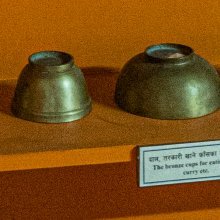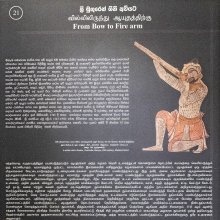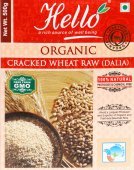Dal: 13 definitions
Introduction:
Dal means something in Hinduism, Sanskrit, Hindi, biology. If you want to know the exact meaning, history, etymology or English translation of this term then check out the descriptions on this page. Add your comment or reference to a book if you want to contribute to this summary article.
Images (photo gallery)
Biology (plants and animals)
Source: Google Books: CRC World Dictionary (Regional names)Dal in India is the name of a plant defined with Chukrasia tabularis in various botanical sources. This page contains potential references in Ayurveda, modern medicine, and other folk traditions or local practices It has the synonym Chikrassia trilocularis (G. Don f.) M. Roemer (among others).
Example references for further research on medicinal uses or toxicity (see latin names for full list):
· Bull. Sci. Nat. Géol. (1830)
· Hortus Bengalensis (1814)
· Rev. Gen. Pl. (1891)
· Phytotherapy Research (2003)
· Flora Indica, or ‘Descriptions of Indian Plants’ (1832)
· Phytochemistry (2833)
If you are looking for specific details regarding Dal, for example chemical composition, pregnancy safety, diet and recipes, extract dosage, health benefits, side effects, have a look at these references.

This sections includes definitions from the five kingdoms of living things: Animals, Plants, Fungi, Protists and Monera. It will include both the official binomial nomenclature (scientific names usually in Latin) as well as regional spellings and variants.
Languages of India and abroad
Sanskrit dictionary
Source: DDSA: The practical Sanskrit-English dictionaryDal (दल्).—1 P. (dalati, dalita)
1) To burst open, split, cleave, crack; दलति हृदयं गाढोद्वेगं द्विधा तु न भिद्यते (dalati hṛdayaṃ gāḍhodvegaṃ dvidhā tu na bhidyate) Uttararāmacarita 3.31; अपि ग्रावा रोदित्यपि दलति वज्रस्य हृदयम् (api grāvā rodityapi dalati vajrasya hṛdayam) 1.28; Mālatīmādhava (Bombay) 9.12,2; दलति न सा हृदि विरहभरेण (dalati na sā hṛdi virahabhareṇa) Gītagovinda 7; Amaruśataka 43.
2) To expand, bloom, open (as a flower); दलन्नवनीलोत्पल (dalannavanīlotpala) Uttararāmacarita 1; स्वच्छन्दं दलदरविन्द ते मरन्दं विन्दन्तो विदधतु गुञ्जितं मिलिन्दाः (svacchandaṃ daladaravinda te marandaṃ vindanto vidadhatu guñjitaṃ milindāḥ) Bv.1.15; Śiśupālavadha 6.23; Kirātārjunīya 1.39. -Caus. (da-dā-layati)
1) To cause to burst, tear asunder.
2) To cut, divide, split.
3) To dispel, drive or chase away; दलयति परिशुष्य- त्प्रौढतालीविपाण्डुः (dalayati pariśuṣya- tprauḍhatālīvipāṇḍuḥ) Mālatīmādhava (Bombay) 8.1.
4) To wither. -With उद् (ud) (caus.) to tear up.
-vi 1 To break, split, crack; त्वदिषुभिर्व्यदलिष्यदसावपि (tvadiṣubhirvyadaliṣyadasāvapi) N.4.88.
2) to dig up.
Source: Cologne Digital Sanskrit Dictionaries: Shabda-Sagara Sanskrit-English DictionaryDal (दल्).—[dala] r. 1st cl. (dalati) r. 10th cl. (dālayati-te) 1. To cut, to divide, to split or pierce. 2. To be cut, &c. 3. To display. 4. To wither. bhvā0 aka0 bhede saka0 bhedane seṭ . bhedane curā0 ubha0 saka0 seṭ .
Source: Cologne Digital Sanskrit Dictionaries: Benfey Sanskrit-English DictionaryDal (दल्).— (akin to dṛ10), i. 1, [Parasmaipada.] To burst, [Lassen, Anthologia Sanskritica.] 66, 15. [Causal.] dālaya, To cause to burst, [Suśruta] 1, 262, 9, dalita, 1. Burst, Mahābhārata 8, 4633. 2. Split, wounded, [Prabodhacandrodaya, (ed. Brockhaus.)] 87, 13. 3. Destroyed, [Prabodhacandrodaya, (ed. Brockhaus.)] 116, 6. 4. Visible, [Prabodhacandrodaya, (ed. Brockhaus.)] 40, 10.
— With the prep. ava ava, To burst, [Suśruta] 2, 166, 6.
— With ud ud, [Causal.] To divide, Mahābhārata 12, 7349.
— With vi vi, 1. To burst, Naiṣ. 4, 88. 2. To rend, [Rāmāyaṇa] 2, 87, 10 Gorr. vidalita, Crushed, [Bhartṛhari, (ed. Bohlen.)] 2, 77.
— With sam sam, saṃdalita, Pierced, [Lassen, Anthologia Sanskritica.] 73, 12.
— Cf. dṛ10.
Source: Cologne Digital Sanskrit Dictionaries: Cappeller Sanskrit-English DictionaryDal (दल्).—dalati [participle] dalita (q.v.) burst, split, open ([intransitive]). [Causative] dālayati & dalayati cause to burst, divide, tear or drive asunder.
Source: Cologne Digital Sanskrit Dictionaries: Monier-Williams Sanskrit-English DictionaryDal (दल्):—(= √dṝ) [class] 1. lati (pf. dadāla, [Bhaṭṭi-kāvya xiv]; [Aorist] [plural] adāliṣur, [xv])
—to crack, fly open, split, open (as a bud), [Suśruta ii, 16; Śiśupāla-vadha ix, 15; Bhāminī-vilāsa i, 4; Amaru-śataka; Gīta-govinda; Dhūrtasamāgama] :
—[Causal] dālayati, to cause to burst, [Suśruta; Bhaṭṭi-kāvya] : dal idem, Anargh, [Gīta-govinda i, 8 [Scholiast or Commentator]] ;
—to expel, [Mālatīmādhava viii, 1; Kathāsaritsāgara lviii, 8];—[cii, 58];—cf. ava-, ud-, vi-.
Source: Cologne Digital Sanskrit Dictionaries: Yates Sanskrit-English DictionaryDal (दल्):—(ki) dalati dālayati 1. 10. a. To cut, divide; to shew; to wither.
Source: DDSA: Paia-sadda-mahannavo; a comprehensive Prakrit Hindi dictionary (S)Dal (दल्) in the Sanskrit language is related to the Prakrit words: Dala, Visaṭṭa.
[Sanskrit to German]
Sanskrit, also spelled संस्कृतम् (saṃskṛtam), is an ancient language of India commonly seen as the grandmother of the Indo-European language family (even English!). Closely allied with Prakrit and Pali, Sanskrit is more exhaustive in both grammar and terms and has the most extensive collection of literature in the world, greatly surpassing its sister-languages Greek and Latin.
Hindi dictionary
Source: DDSA: A practical Hindi-English dictionaryDal in Hindi refers in English to:—(nm) a party; group; team; troop; swarm; herd; petal; leaf; thickness of layers etc.; used in compound words as the second member to denote multitude; [tiddi-dala, sainika-dala; ~dara] of thick layer, pulpy; ~[pati] chief or leader of a team/group etc; ~[bamdi] groupism, group politics; —[bala] an army of followers and supporters; •[sahita] in full force; —[badala] defection; •[ki rajaniti] politics of defection; ~[badalu] a defectionist; —[badala] mass of clouds; —[bamdhana] to form a gang..—dal (दल) is alternatively transliterated as Dala.
...
Kannada-English dictionary
Source: Alar: Kannada-English corpusDal (ದಲ್):—
1) [independent] an indeclinable used to express the adverbial meaning as 'certainly', 'indeeḍ, 'is it not so', etc.clause2) [independent] an indeclinable used to mean 'is it not.clause
Kannada is a Dravidian language (as opposed to the Indo-European language family) mainly spoken in the southwestern region of India.
Nepali dictionary
Source: unoes: Nepali-English DictionaryDal is another spelling for दल [dala].—n. 1. a piece torn or split off; fragment; 2. small shoot or blade; a petal; a leaf; 3. group; gang; 4. party; company; 5. regiment; brigade;
Nepali is the primary language of the Nepalese people counting almost 20 million native speakers. The country of Nepal is situated in the Himalaya mountain range to the north of India.
See also (Relevant definitions)
Starts with (+895): Dal chini, Dal ku na, Dal mung, Dal-kosh, Dala, Dala maram, Dala tushila, Dala-adhikari, Dala-chinni, Dala-qo, Dala-vritti, Dalaa-akumo, Dalaagi, Dalaam, Dalaba, Dalabadala, Dalabala, Dalabandi, Dalabani, Dalabhaji.
Ends with (+677): Aaraksh-dal, Accamatal, Adal, Adavikadale, Addal, Adimodal, Aggadal, Agnishamak-dal, Akamatal, Akbar kandal, Alamutaittatal, Alimutal, Alivodala, Aliyamutal, Allidal, Allittal, Anaittal, Antaikkatal, Antal, Aptal.
Full-text (+119): Nirdalana, Dalana, Vidalana, Dala, Uddal, Avadal, Dalika, Vidalita, Dali, Visatta, Dalita, Uddalaka, Rajanitika-dala, Masuri-dal, Dal mung, Rahar dal, Arhar dal, Dal chini, Qalami-dal-chini, Bahya-dala.
Relevant text
Search found 21 books and stories containing Dal; (plurals include: Dals). You can also click to the full overview containing English textual excerpts. Below are direct links for the most relevant articles:
The Political Scene < [January – March, 1996]
Indian Political Scene < [January – March, 2000]
Excerpts from Barrister Parvateesam < [October – December 1991]
Kashyapa Shilpa-shastra (study) (by K. Vidyuta)
4. Prākāra components (7): Rules for plastering < [Chapter 3 - Prākāra Lakṣaṇa]
Heimskringla (by Snorri Sturlson)
Part 24 - Magnus The Blind; His Birth < [Chapter XII - Saga Of Sigurd The Crusader And His Brothers Eystein And Olaf]
Chaitanya Bhagavata (by Bhumipati Dāsa)
Verse 1.8.135 < [Chapter 8 - The Disappearance of Jagannātha Miśra]
Verse 1.4.34 < [Chapter 4 - Name-giving Ceremony, Childhood Pastimes, and Thieves Kidnap the Lord]
Bodhisattvacharyavatara (by Andreas Kretschmar)
Text Sections 196-197 < [Khenpo Chöga’s Oral Explanations]
Text Section 201 < [Khenpo Chöga’s Oral Explanations]
The Great Chariot (by Longchenpa)
Part 1 - The summary of the essence < [A. The general explanation of being free and well favored, so difficult to obtain]
Part 2a - The extensive explanation of the eighteen freedoms and favors < [A. The general explanation of being free and well favored, so difficult to obtain]
Related products
(+15 more products available)








